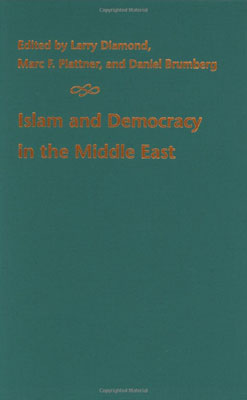Source: Johns Hopkins University Press, September 2003
 Provides a comprehensive assessment of the origins and staying power of Middle East autocracies, as well as a sober account of the struggles of state reformers and opposition forces to promote civil liberties, competitive elections, and a pluralistic vision of Islam. Drawing on the insights of some twenty-five leading Western and Middle Eastern scholars, the book highlights the dualistic and often contradictory nature of political liberalization. As the case studies of Morocco, Algeria, Egypt, Jordan, Kuwait, Qatar, and Yemen suggest, political liberalization—as managed by the state—not only opens new spaces for debate and criticism, but is also used as a deliberate tactic to avoid genuine democratization.
Provides a comprehensive assessment of the origins and staying power of Middle East autocracies, as well as a sober account of the struggles of state reformers and opposition forces to promote civil liberties, competitive elections, and a pluralistic vision of Islam. Drawing on the insights of some twenty-five leading Western and Middle Eastern scholars, the book highlights the dualistic and often contradictory nature of political liberalization. As the case studies of Morocco, Algeria, Egypt, Jordan, Kuwait, Qatar, and Yemen suggest, political liberalization—as managed by the state—not only opens new spaces for debate and criticism, but is also used as a deliberate tactic to avoid genuine democratization.
Contributors: Shaul Bakhash, George Mason University; Ladan Boroumand, Abdorrahman Boroumand Foundation for the Promotion of Human Rights and Democracy in Iran; Roya Boroumand, Abdorrahman Boroumand Foundation; Jason Brownlee, Princeton University; Daniel Brumberg, Georgetown University; Abdelwahab El-Affendi, University of Westminster; Haleh Esfandiari, Woodrow Wilson International Center for Scholars; Abdou Filali-Ansary, editor of Prologues: revue maghrébine du livre; Michael Herb, Georgia State University; Ramin Jahanbegloo, Aga Khan University, London; Mehrangiz Kar, lawyer, writer, and human rights activist; E. Fuat Keyman, Koç University, Istanbul; Laith Kubba, National Endowment for Democracy; Vickie Langohr, College of the Holy Cross; Bernard Lewis, Princeton University; Russell Lucas, Wake Forest University; Abdeslam Maghraoui, Princeton University; Radwan Masmoudi, Center for the Study of Islam and Democracy, Washington, D.C.; Ziya Önis; Koç University; Soli Ozel, Bilgi University, Istanbul; William Quandt, University of Virginia; Jillian Schwedler, University of Maryland, College Park; Jean-François Seznec, Columbia University and Georgetown University; Emmanuel Sivan, Hebrew University; Mohamed Talbi, independent scholar; Robin Wright, Los Angeles Times.
About the Editors
Larry Diamond is senior fellow at the Hoover Institution, and codirector, with Marc Plattner, of the International Forum for Democratic Studies. He is also coeditor, with Marc Plattner, of the Journal of Democracy. Daniel Brumberg is visiting scholar with the Democracy and Rule of Law Project at the Carnegie Endowment and associate professor of government at Georgetown University.
